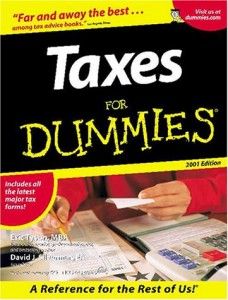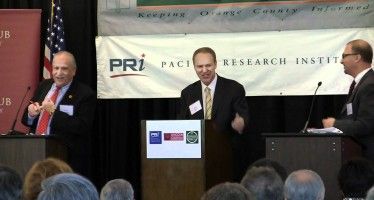Skelton misleads on car tax
By John Seiler
Los Angeles Times columnist George Skelton recently was feted by liberal journos and others for reporting on California for 50 years. Actually, usually he’s been just a rubber stamp for the centralized tyranny known as the California government.
His latest outrage: Misrepresenting Gov. Arnold Schwarzenegger’s cancelling the car tax increase back in 2003, one of the few things Arnold right. The much-awarded Skelton wrote an article ridiculously titled, “Overspending isn’t California’s problem: Face it: More budget cuts won’t pay for everything the state needs.”
“Everything the state needs” means the greedy pay, perks and pensions going to his buddies in the government. Here’s the misleading part:
“Sacramento, for example, still is spending way too much money on former Gov. Arnold Schwarzenegger’s showboating car tax cut.
“Yes, that crowd-pleasing slash in the vehicle license fee — which had existed for many decades without a public fuss — resulted in a $6-billion annual spending burden on the state treasury. That’s because the car tax revenue had gone to local governments. When Schwarzenegger cut it in 2003, he kept sending an equivalent amount of money to the locals anyway.”
“spending … money” on a “tax cut”? What a revealing phrase. Skelton assumes that government owns you and everything you produce; you’re its slave. It then “spends” money on education, roads, prisons, cops, pensions, etc. — and “spending” includes dribbling back to you a little of what it stole from your slave labor to use for your own family.
What happened
Now, here’s what really happened, as Skelton should remember, or as anyone with an Internet connection can find out:
1. Gov. Gray Davis illegally tripled the car tax. Then-state Sen. Tom McClintock wrote at the time, right in Skelton’s own L.A. Times in 2003 just after Arnold was elected to replace Davis and canceled the illegal tax increase:
“Five years ago, a series of legislative enactments reduced the car tax by two-thirds. Local governments, which pay for firefighters, never lost a penny of funding because the law fully reimbursed them from the state’s General Fund. The law even provided that if the state should go bankrupt, funds would still flow to local governments through a temporary, month-to-month car tax increase directed by the state controller.
“In June, Gov. Gray Davis tripled the car tax by fiat while cutting off reimbursements to local governments for three months. His action cost cities and counties $1 billion in lost revenue and cost motorists an additional $4 billion in unauthorized taxes. The only time local governments have lost money from the car tax is when Davis raised it.
“The official legal office of the Legislature has already opined that not one of the conditions required to raise the tax has been met. If the courts agree, the illegally collected tax — plus interest — must ultimately be returned, blowing a new multibillion-dollar hole in a future state budget.”
2. Davis’ illegal tripling of the car tax was the casus belli of the recall against him. Other factors, such as his dithering during the 2001-02 electricity crisis, contributed to his being booted from office. But his illegal tax increase enraged voters during that summer of their discontent. Still, only 55 percent voted to send him into retirement. Without his carjacking of car drivers, Davis probably would have beaten the recall.
3. Schwarzenegger won the recall election on a strong promise to rescind the illegal car tax tripling. Shouldn’t politicians keep their promises? He never would have won the recall with that promise, because Davis, as noted, would have stayed in office. And Arnold’s solemn pledge to “terminate” the illegal tax increase guaranteed he would win first place among the replacement candidates.
4. If Arnold had not rescinded the illegal car tax, he would have started his new governorship by breaking the pledge that bonded him to voters, possibly sparking his own recall. Of course, Arnold ended up being a terrible governor because, after two years, he started listening to liberals like his wife, Maria, and Skelton. He imposed the dictatorial, anti-jobs AB 32 in 2006. And in 2009, he imposed a record $13 billion tax hike that slammed the state economy during the start of the weak recovery.
5. If Arnold had not rescinded the car tax, McClintock was readying both court challenges and a papers to file a repeal initiative, which would have passed overwhelmingly in 2004. So the tax hike would have disappeared anyway.
6. By canceling the tax cut, Arnold demonstrated — for two years, anyway — that it was safe again in California to run a business or be a worker who paid taxes; that people like Skelton wouldn’t automatically be allowed to paint a bull’s eye on you back just because you held a job an drove a car.
7. The middle class was given a little reprieve. But Skelton doesn’t care about the middle class, the folks who toil long hours for their families and pay the massive taxes to live in the most dysfunctional state in the land just because it has good weather. And Arnold, after he became Benedict Arnold in 2006, also didn’t care about the middle-class folks who mistakenly put him into power in 2003 instead of the great McClintock.
Fortunately, Californians no longer need to depend on the old, Main Stream Media, like the L.A. Times and Skelton. Alternatives like CalWatchDog.com now exist to let people know what’s really going on.
Related Articles
Greenhut-Berardino Debate on Pensions
APRIL 27, 2011 By JOHN SEILER It was the Great Pension Debate. Yesterday Steven Greenhut, editor-in-chief of CalWatchDog.com, debated Nick
California encourages business flight
Dec. 21, 2012 By Joseph Perkins Employees at Chevron’s San Ramon corporate headquarters received an unexpected email yesterday. It notified
CEOs Rank CA Worst State for Business
MAY 5, 2011 By JOHN SEILER Once again, California garners the booby prize for business climate: For the seventh year




